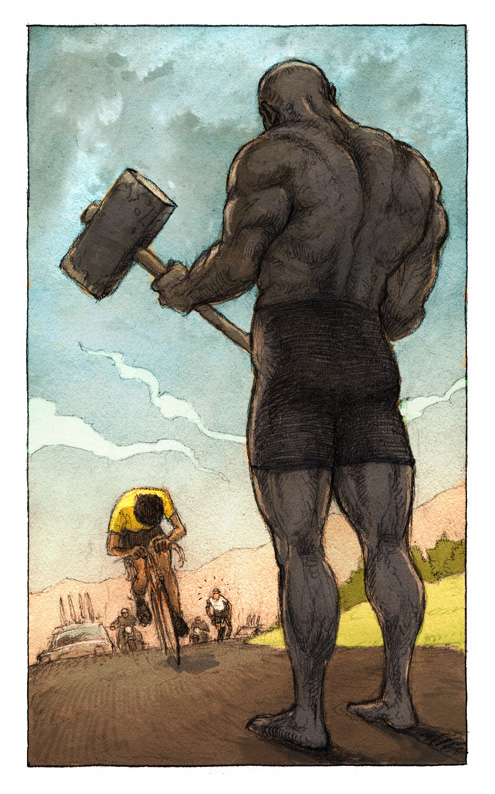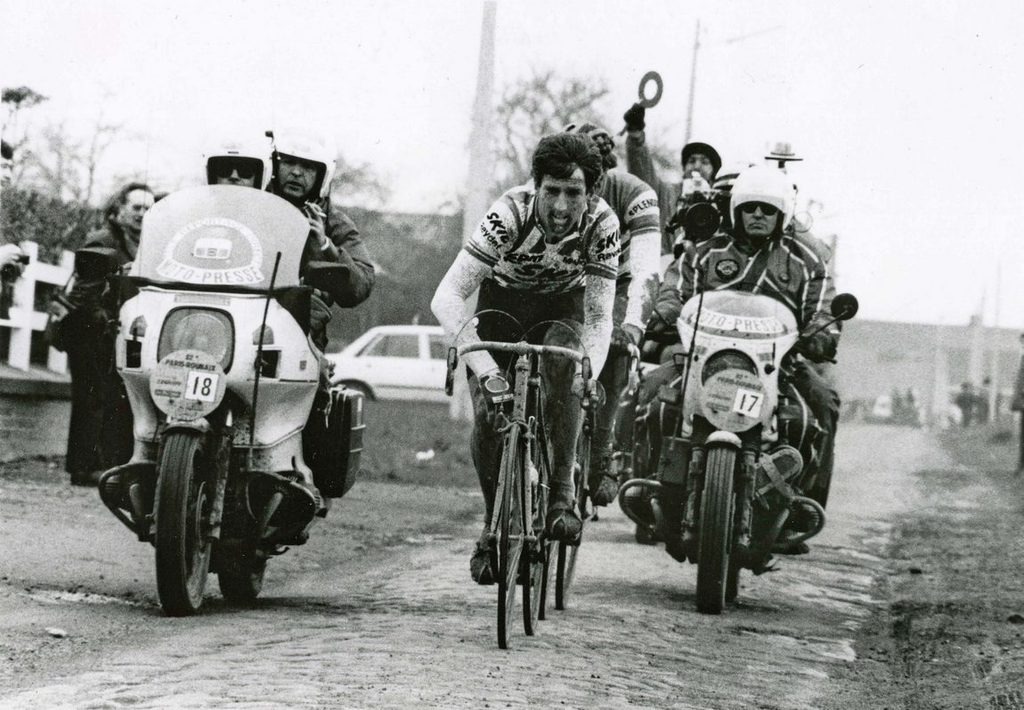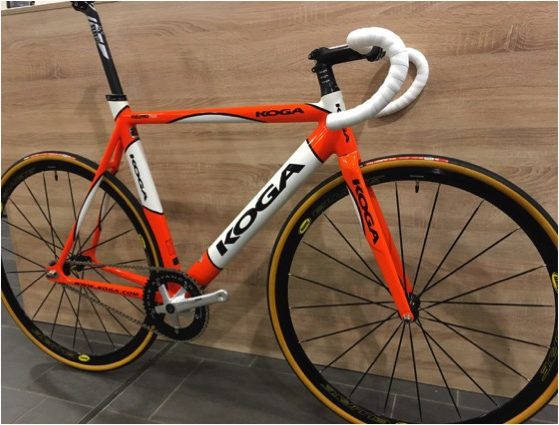Guest Article: V-Books of the Year – A Personal Choice

@Blackpooltower is obviously spending all his n+1 money on new cycling books, or he works in the little seen cycling-specific bookshop. Either way, he is nice enough to catch us all up on what is vvorthy. The lead image alone is enough, it’s fantastic. It’s worthy of its own article or, even better, a movie.
It is not too late for hints dropped for the cyclist-who-has-everything’s (impossible) holiday gifts. I want them all, hint, hint. And chapeau @Blackpooltower for thinking of us illiterate handlebar-tape chewing beasts.
Your in Cycling, Gianni
The autobiography is a medium particularly well suited to the needs of the racing cyclist. What other platform affords such scope to settle scores, explain away failures, relive glories and bitch about bad luck at length and without danger of interruption?
In fact I’ve often wondered if one of the reasons sporting ghost-writers get paid so well is that, like beekeepers with stings, there’s a threshold to the amount of self-justification one person can hear before they simply go mental. It’s actually psychic danger money these guys are earning.
Cycling memoirs are a mixed bag at best, but we may as well get used to them: much as a wine enthusiast has to tolerate being given ever more superfluous corkscrews each Christmas, so a cycling fan will receive the latest biog of their country’s top pro, like it or not.
What follows is a personal selection of the three best cycling books of the year. But first, a roundup of some of the rest:
The Climb by Chris Froome is worthy but unmemorable, except for the early years in Kenya, which are startlingly pythony (and no, I don’t mean Pythonesque; he was really, really into pythons). At Speed is Mark Cavendish’s latest. He’s driven, he’s demanding, he’s a bit of a nightmare to live with … you know it already.
If the superstars’ books feature a lot of abandonments, crashes and moments of not-winning, the domestiques’ contain little else. So when you embark on the story of someone who has taken the cycling equivalent of the vows of the Black Watch and have all but renounced winning, for life … it can be a bit of a trudge, but a bracing and instructive one, if written well (see Domestique, Le Metier and Dog in a Hat).
Christophe Bassons didn’t set out to be a domestique, but his bloody-minded and almost masochistic stand against doping made anything else impossible, as he relates in A Clean Break. If you’ve never understood why it’s hard for a rider to resist doping, check out Bassons’ life on the road and the schoolyard bullying he endured day after day. It’s a worthy document of a heroic career, but you do find yourself muttering “Oh why can’t you just … win something, Christophe?”
And if you really want to wallow in failure, Lanterne Rouge is a well-researched and witty view from the (very) back of the pack.
V-Books of the Year
Rule #10 Award: Legends of the Tour by Jan Cleijne
Who knew cycling and bandes dessines were a match made in heaven? Jan Cleijne, clearly. You only need to see one panel of this superb graphic work to understand why: Eddy Merckx and The Man With the Hammer. This book thrillingly celebrates the myths of cycling in (super-)heroic comic book style. I handed this to my ten year old son, saying “You want to know why I like cycling? …”
As a concentrated lesson in cycling never getting easier, just faster, and in Looking Fantastic through every era, this is hard to top.
Rule #9 Award: Gironimo! by Tim Moore
“My genitals have now come back to life – and in some style, if I may say so.”
Don’t be put off by the “quirky” cover, which seems to place this book in the contrivance-heavy genre of “oddball travel memoir”. This is an exceptional and highly V-relevant book.
Even a straight history of the 1914 Giro – diabolical in its length and its conditions – would be worth reading. This book goes quite a bit further: Tim Moore builds a period bike – wooden rims, cork pads and all – then rides the fucker round the whole route, treating us to amusing tales of his own misfortunes and a parallel commentary of the ’14 race. Moore is insightful, inspiring and very funny, whether dispensing hard-won road wisdom (“The touring cyclist’s core skill: being asleep when it’s raining”) or offering up his own misfortunes for our entertainment (“I dismounted like a dalek at a rodeo”). A classic.
Rule #71 Award: Faster by Michael Hutchinson
Michael Hutchinson, or Doctor Hutch, will be known to many for his journalism and also The Hour – the outstanding set text for all followers of the resurgent hour record competition.
Faster is a gloriously nerdy survey of all the things cyclists do to get faster. Hutchinson examines them all in turn with the twin objectives of a) evaluating their effectiveness and b) taking the piss out of them when appropriate. And it is always appropriate.
In his overwhelming obsession with the minutiae of cycling and matching refusal to take it too seriously, Doctor Hutch is one of us. Just quite a bit faster (blame his lungs, whose output numbers are apparently “in horse territory”).
When he’s not laughing at pros with their beet-pink urine and their hatstand physiques, he can be very profound on the central truths of the sport.
“Parts of an athlete’s life are hard, yes. But having the chance to devote yourself to something that’s both so extraordinary and so unnecessary means it’s also rather wonderful.”
Honourable mentions go to The Ride Journal and The Cycling Anthology, which have joined Rouleur as exceptional sources of contemporary cycling writing. The former is a non-profit and invites submissions from anyone. The latter is based in the established sports writing community but no less passionate for it, and always surprises and delights. Oh and I can’t not mention Ned Boulting’s 101 Damnations, for sheer charm.
Stop press: Bike Mechanic by Guy Andrews has just been delivered. It might be the best bike book ever.


Is that the Man with the Hammer or the Incredible Hulk’s non-green cousin?
Nice list to work through there, thanks for the additions to pass to the VMW for the Christmas list.
that is indeed a FANTASTIC photo!
I was handed a copy of Legends of The Tour earlier this year by my lovely, surprising Dad. I hadn’t seen it on the shelves and having looked at the first couple of pages was initially a bit underwhelmed. My initial reaction was completely misguided, what an incredible book, the artwork is so evocative and I found the book incredibly inspiring. My personal favourite is Anquetil literally against the clock, it makes you want to get out on your bike, can’t explain why. Great article @blackpooltower
I was surprised how funny Faster was; for what could be a terribly dry subject, even for nerds like us, it made me laugh a lot.
I really need to dig out the quote about resting…
Faster is great, but the cycling book of the year is always The Rider.
@The Grande Fondue
I concur! I periodically pull The Rider from the shelf and I find it just as compelling as the first time I read it.
@gilly Totally agree about the Anquetil bit. And thank you!
Great article.
All 3 now on the crimbo list and great to see some familiar names.
I have read Tim Moores – French Revolutions which is also very good and as for Hutch, well over here he is a legend known more commonly as the writer of the back page article in Cycling Weekly and he never ceases to bring a wry smile or laugh to my face.
@gilly
Anquetil was one of the greatest characters of cycling. His motivations were so different to the rest of the peloton and his life from farm labourer to legend is fascinating. Sex, Lies and Handlebar Tape is an awesome read, and although it covers his strange Menage a Trois with his ex wife and stepdaughter in the last couple of chapters, by far the best parts of the book are the racing!
Reckless: The Life and Times of Luis Ocana by Alasdair Fotheringham is well worth a read. Not only one of the few people to give Merckx a proper test but a complex and interesting character as well. As unconventional as Anquetil.
Good selection, and I will add Legends of the Tour to my list. Sounds like one for hard copy not Kindle.
Faster would be my cycling book of the year, because Hutch writes so well and really brings to life a very nerdy and obscure segment of cycling in a way which anyone who has trained or tried to be competitive, at any level, will appreciate.
Gironimo has some good anecdotes and it is worth a read but don’t expect it to be so eye-wateringly funny as French Revolutions. Sometimes though I find his cluelessness a little frustrating and it wears thin. Like reading about someone trekking to the south pole and not realising it was going to be really cold; there is humour in the situation but it contends with the desire to just slap them.
I would give Lanterne Rouge a bit more praise. Although there are certainly some hapless and unfortunate instances it isn’t just about wallowing in failure. It is often a celebration of determination and bravery. And as you say it is very well researched – not just stories gather from press archives but interviews and meetings with quite a few of the people involved which brings it to life very well.
@Deakus
I have read that one @deakus. As you say, some of it made for uncomfortable reading and I find it hard to find empathy with someone as narcissistic as Anquetil. But as a rider, he was exceptional. There was a recent post on velominati of him riding out of the doors of his chateau which kind of completed the loop.
Thanks for the reviews, will look into them all.
If I may make a modest contribution:
Etape: The untold stories of the defining stages of the Tour de France’s defining stages (Richard Moore)
Bike! A tribute to the worlds greatest racing bicycles (Richard Moore and Daniel Benson)
@PT Agree about Etape; fascinating stories in there. And thank you.
@ChrisO You’re right – I didn’t quite give Lanterne Rouge its due. It’s a very well written and insightful book. And yes, good call about Legends – definitely need the physical thing!
@ChrisO
My reaction to Michael Hutchinson’s The Hour was like yours to Gironimo, I wanted to say, if this was easy anyone would do it, FFS.
But I might still have to read this. It sounds like some of the British mountaineering epics where these things are planned in a pub only because it sounds like a good (drunk) idea and even the next morning they continue to go forward.
It’s somehow reassuring that the man with the hammer wears cycling shorts and maybe shaves his legs. He must be an ex-pro, who stalks the earth to teach cyclists those life lessons that can only be learned one way.
@Gianni
No way in hell, not with an upper body like that. The Man With The Hammer is a professional rockbreaker and definitely Hard, but he’s not a cyclist. He’s the enemy.
Sean Yates is probably the pro cyclist least likely to lose a bar fight, and he is a tiny twig of a man compared to The Hammer.
@SamFromTex
Much has been written about the man, but little as to his identity as a cyclist. I always assumed he was one of us, in a sense, for what other reason works he be out lurking on the road?
@therealpeel
No way a cyclist… Professional Rockbreaker? Yea, probably. Though I never envisioned him standing on top of the hill looking ready to crush a soul. The handful of times I’ve met him he’s kinda sorta snuck up on me. So maybe part Ninja?? But only a small part. Mostly just a Professional Rockbreaker. That about fits. Cheers
I’ve just finished reading the Death of Marco Pantani. Not an uplifting read.
I’ve got Sean Yates’ autobiography to read next.
@gilly
Be that as it may be, there’s no denying that he was one fantastic looking fucker…
Just read Faster and it’s interesting what pops out at you. One thing that struck me was the use of Fish Oil as an anti-inflammatory/recovery aid and that it was potentially more effective (and less disruptive) than Ibuprofen. I’ve long been a fan of Fish Oil as it seems to help with all the aches and pains I’ve collected from the various sports I’ve participated in over the years. I’ve always been happy that it may just be a placebo effect but have definitely found I seize up somewhere if I stop taking it.
Something I discovered from a sports physio about Ibuprofen a few years ago (post Achilles rupture/surgery) is that while it does reduce swelling it does so by blocking some processes that are inherent in the bodies healing process. So potentially Ibuprofen is not such a great thing to take post injury if taken for a while as a combined painkiller anti-inflammatory.
Though Hutchinson did point out that all Fish Oils are not equal. So I might have to reach for the more expensive ones when the current stock runs dry.
Was lent a copy of “The Rider”, about half-way through right now- can say it is a good read. Went and “borrowed” this review from someone a whole lot more versed in the use of a keyboard than myself:
” Krabbé doesn’t waste a word. Nearly every paragraph contains innuendos and significance that could only be penned by a seasoned bike rider who has a deep understanding of the sport. If you’ve ever thought about something during a bike race, Krabbé writes it down on paper. I have so many favorite quotes, truisms, and stories from this book I’d have to write something from every page. Here are just a few to give you a taste of what this book is about:
Page 9 | After one kilometer, a minuscule rider with a lack rag-mop attacks: Despuech. Baloney. This race lasts 140 kilometers. Despuech is crazy. He is only showing us that he doesn’t stand a chance in hell. He knows it too, but still it’s a fact: he has to choose between finishing at the back after shining, or finishing at the back after not having shone at all.
Page 15 | It’s too early. Always attack as late as you can, but before the others do.
Page 19 | Bicycle racing is a sport of patience. Racing is licking your opponent’s plate clean before starting on your own. Lebusque will stay out in front for kilometers. Where would we be without Lebusque? Lebusque doesn’t know what racing is.
Page 20 | Every once in a while someone along the road lets us know how far behind we are. A man shouts: ‘Faster!’ He probably thinks bicycle racing is about going fast.
Page 32 | The crowd falls for it every time. How often have I seen people clapping and cheering for a rider who, having been lapped six times, pushes on bravely? It’s an insulting brand of applause – for where does a winning rider get the right to revel in applause if the crowd isn’t obliged to hiss at him when he fails?
Page 41 | Kilometer 44. A sign: COL DE RIESSE, altitiude 920m. Every time I take a pull up front, I feel it: I’m strong today. So what if I attack right here? Then my chances would be reduced. Correct.
Page 53 | Fourty-three nineteen. My gear lever feels like a scab on a wound. During our reconnaissance ride I was using forty-three twenty here. Now I’m sticking to the nineteen, a matter of willpower. My twenty was still as clean as a whistle. Shifting is a kind of painkiller, and therefore the same as giving up. After all, if I wanted to kill my pain, why not choose the most effective method? Road racing is all about generating pain.
Pate 60 | I look at a girl in the crowd. She’s sixteen, she’s pretty. ‘Allez, les sportifs’, she shouts. ‘Un deux un deux.’ Why is she shouting like that? She know Hinault fell into a ravine, but not the names of the classics he won. Classics? She knows everything about Poupou, but she’s never heard of Milan-San Rimo, has no idea what fourty-three nineteen is. What gives her the right to raise her voice?…She’s the generation that no longer cheers for the riders, but for the journalistic cliche she recognizes in them. Now that I’m five centimeters closer, I can see how pretty she really is. I hate her.
Page 65 | My whole life had only one goal: making that last wheel, here, now. I was wasted. But that elusive finish line, eight, seven, six and a half meters in front of me, kept my hope and desire awake. I coughed and slobbered. I remembered the words of advice ‘Shift, when you’re really, truly at the end of your rope, to a higher gear.’ I shifted. A few hysterical kicks on the thirteen, then clenched power of a mortal struggle. I was there. I was sitting on that last wheel. I was in the lead group.
Page 69 | Road racing imitates life, the way it would be without the corruptive influence of civilization. When you see an enemy lying on the ground, what’s your first reaction? To help him to his feet. In road racing, you kick him to death.”